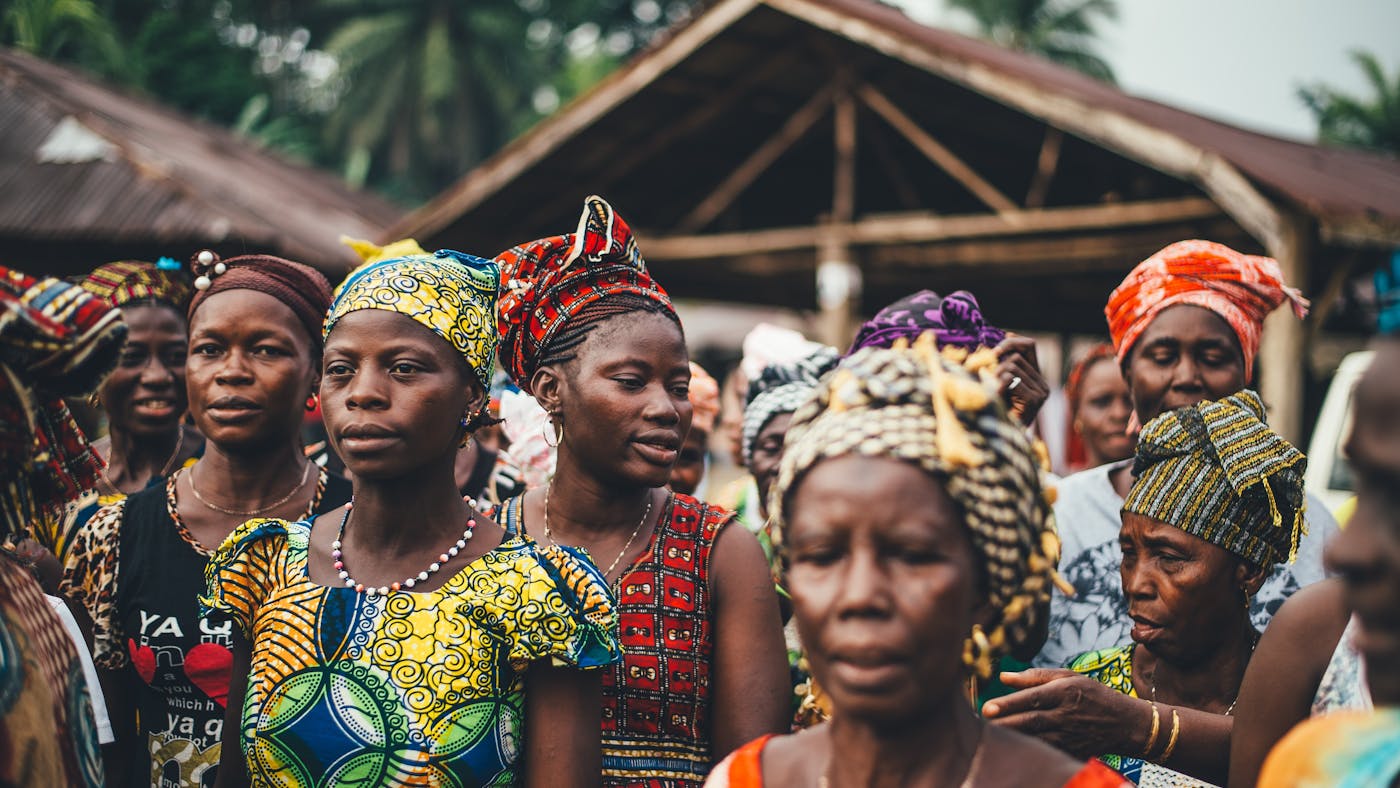11-28-19 Imagine Life Without Words
Imagine Life Without His Words
Why We Translate the Bible

Ten years ago, my wife and I moved from the United States to France (to study French), and then to Cameroon, Central Africa, as recently minted members of Wycliffe Bible Translators. Our hearts had been gripped by Paul’s logic inRomans 10:14–17: sent ones are needed to proclaim the word of Christ, yet many do not even have access to a word of Scripture that can be so proclaimed. And we were deeply impacted to learn that the highest concentration of languages needing Bible translation to begin is in Asia and Africa. We sensed God leading us to relocate to Africa.
In Cameroon, we soon found ourselves setting up home with a newborn in a village in order to provide exegetical support in an active Old Testament translation project, among the Funom people (pseudonym used to protect the work). A charismatic, visionary leader and ardent follower of Jesus named Kimal was serving as the president of their language committee. Despite it being a stormy day during rainy season, he and other Funom brothers greeted us upon arrival with big smiles and warm hearts, and we joined them in the translation work. There is no doubt about it: these brothers who are dedicating their very lives to the translation task are the Wycliffes, Tyndales, and Luthers of the Funom people. What an honor it was to serve with them! My wife and I had a marvelous missions honeymoon. For a month.
Reality quickly set in. My wife, pregnant at the time with our second child, contracted malaria. We were physically and psychologically stretched to the max as we set up our home while learning the language, assisting in the translation, and adapting to the culture and customs around us. People everywhere had seemingly insurmountable needs — physical, spiritual, and more. And calls to prayer from the region’s majority religion sounded out five times a day, from predawn until sundown. We quickly chose to convert these calls into reminders to earnestly pray that God would refresh us with the gospel, move people to submit to his kingship, and cause his word to “speed ahead and be honored” (2 Thessalonians 3:1). Even in the midst of all these challenges, it was a joy to be with the Funom.
“We had to evacuate due to security concerns. But the translated Scriptures would stay.”
A little over a year later, our organization had us evacuate due to security concerns. We had to leave, but the translated Scriptures would stay. And the Funom continue carrying out the Great Commission with the previously translated New Testament in hand while working on the Old Testament translation. We do not currently live in Cameroon, but now we’re investing in several language groups across Africa and Asia as I serve as a translation consultant. We praise God for the privilege of helping eighteen language groups thus far have access to more Scripture.
Paradox of Translation Today
The task and value of Bible translation can easily be lost on us as English speakers. With more than 500 Bible translations in English alone, it is easy to take them for granted and to forget the rich history of Bible translation. Over a thousand years ago, scholars like Bede and Aldhelm (seventh and eighth centuries), Wycliffe (fourteenth century), and Tyndale (sixteenth century) translated the Bible (or portions) into English. The English Bible is part of a strong tradition of Bible translation for a public that would otherwise not understand well (or at all) the Scriptures: Greek (Septuagint, Old Testament), Aramaic (Targums, Old Testament), Latin (Vulgate), Syriac (Peshitta), Coptic, and more.
While speakers of languages with such translations enjoy this rich tradition, that is not the case for over 2,000 of the 7,352 known living languages, which do not have a single word of Scripture. Such is the paradox we live in today: an extravagant banquet of Bible translations available in languages of wider communication (like English) but Bible poverty among almost a third of the world’s language groups.
Why Translate the Bible?
Bible translation is not just one missions strategy. It is vital to all missions efforts, because obeying the Great Commission assumes the task of Bible translation: “Go and make disciples of all nations” (Matthew 28:19–20). Though the earliest text of these verses is in Greek, the fact that we can read, preach, study, and memorize these verses today in English is a testament to Bible translation.
“God gave us a whole Book, not just the final chapters. People are yearning for the complete Bible.”
In addition, disciple-making involves teaching all nations “to observe all that I [Jesus] have commanded you” (Matthew 28:20). Such teaching entails speaking words in an understandable language, in order to communicate Jesus’s commands. How much more, then, is Bible translation necessary since Jesus commanded us to teach “all nations” (meaning ethnolinguistic people groups), many of whom do not yet have one word of the Bible translated. That Jesus requires his disciples to observe allthat he commanded — not just some easy-to-understand concepts in a foreign language — further suggests the enterprise and necessity of Bible translation.
The great missionary-dispatching paragraph of Romans 10:14–21 contains a similar assumption. Romans 10:17 says, “Faith comes from hearing, and hearing through the word of Christ.” The translated word is instrumental for people to truly understand the message of Christ in order to trust in him. This verse also applies to more than 400 deaf language groups without Scripture, who do not hear with their physical ears but see as another signer signs. Just as the original recipients of Paul’s letter to the Romans needed someone to read (with their eyes) and communicate it, so also today all who would trust in the Lord — including the deaf — need the translated Scriptures communicated to them.
What’s at Stake
What’s ultimately at stake in Bible translation is the praise and glory of the slain Lamb. Revelation envisions a kingdom people from every tribe and people and language (Revelation 5:9; 7:9). Bible translation aims at our God and the Lamb receiving more and more praise as the translated word impacts ethnolinguistic people groups all around the world.
Thus, for your monolingual English-speaking neighbor, the monolingual speaker of a language in a rural village, and many multilingual speakers who have God’s word in only their second or third language, Bible translation is vital to following Jesus’s commission. As multilingual speakers and signers (deaf) testify, it is simply not enough to teach them a language of wider communication with translated Scripture (whether English, French, Spanish, Burmese, or American Sign Language), since that is not a language that speaks to their hearts.
Translate the Old Testament Too
Bible translation often begins with focused efforts on translating the New Testament, and for good reason. For example, the New Testament records the new-covenant fulfillment of old-covenant anticipations, the work and words of Messiah Jesus as the apex of redemptive history (Hebrews 1:1–4), and clear articulations of the gospel (1 Corinthians 15:1–11). We praise God that 1,550 language groups have the New Testament available and 2,908 translation/language programs are currently active (by comparison, 696 language groups have full Bibles). However, God gave us a whole Book, not just the final chapters.
“Bible translation is not just one missions strategy. It is vital to all missions efforts.”
Today, language groups on every continent are yearning for the complete Bible, including the first three-fourths (which we call the Old Testament). The first-covenant Scriptures were not just for God’s first-covenant people. The Old Testament is for Christians, to receive “instruction,” “encouragement,” and “hope” (Romans 15:4). To have the opportunity to declare “the whole counsel of God” (Acts 20:27). To know how Paul can claim “Christ died for our sins in accordance with the Scriptures” (1 Corinthians 15:3).
Can’t Wait for the Whole Bible
I’ll never forget the day my wife and I were walking in the fields in Cameroon with Kimal. The Funom had celebrated the publication of their New Testament five years prior, but he passionately told us that the people are eager for the whole Bible: “It took more than thirty years to translate the New Testament. We can’t wait that long for the Old Testament.”
Bible translation is for the Funom in Africa. It is for the church in Asia, the Americas, and Europe. And it is for the Ethiopian woman who celebrated every church festival her entire life, but wept upon listening to an audio recording of Jesus’s crucifixion in her own language, saying, “I didn’t know Christ died this way.”
Bible translation is not an optional missions strategy; it is essential. It is assumed, as we have seen, in central missions paragraphs of the New Testament, and many language groups long for not just part of God’s revealed word but for the whole Bible — both New and Old Testaments. Oh, how vital Bible translation is for the global church!

Comments